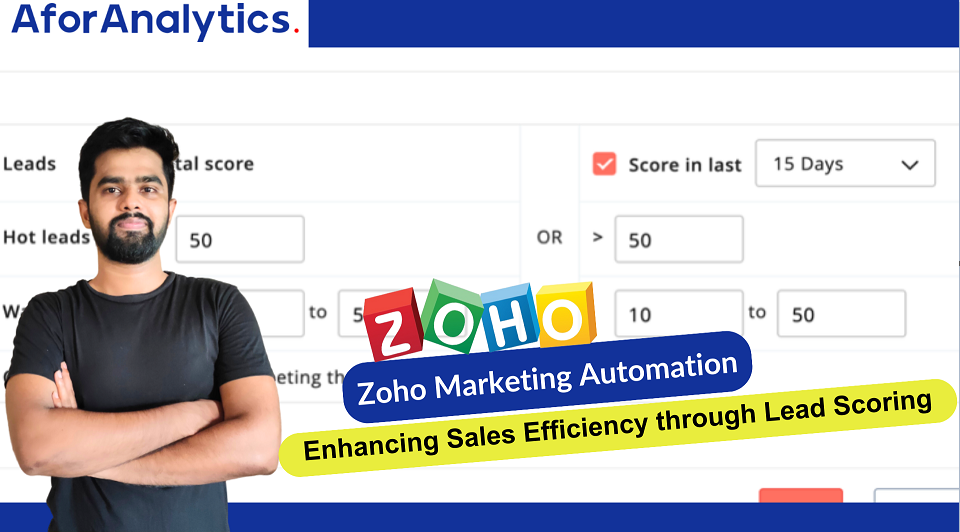In today’s fast-paced sales landscape, time saving is very important for driving increased sales. To streamline sales efforts, it’s imperative to prioritize high-quality leads while filtering out inactive prospects. By monitoring leads’ actions and web engagement, businesses can gain valuable insights into their interests and tailor their approach accordingly.
Understanding Lead Scoring
At its core, lead scoring is a systematic method for evaluating the potential value of leads based on their interactions and engagement with a company’s marketing efforts. By assigning numerical scores to leads, businesses can effectively segment their leads and focus their resources on nurturing those with the highest likelihood of conversion. This strategic approach not only enhances the efficiency of the sales process but also ensures that valuable opportunities are not overlooked or neglected.
The Benefits of Lead Scoring - Driving Sales Effectiveness and Efficiency
Lead scoring offers a multitude of benefits for businesses looking to improve their sales effectiveness and efficiency. By accurately assessing the level of interest and engagement exhibited by leads, businesses can tailor their outreach efforts to align with each lead’s unique preferences and needs. This targeted approach not only increases the likelihood of conversion but also reduces wasted time and resources spent on unqualified leads.
Moreover, lead scoring enables businesses to prioritize their follow-up activities based on the perceived value of each lead. Leads with higher scores are given priority attention, allowing sales teams to focus their efforts where they are most likely to yield positive results. This not only improves the overall efficiency of the sales process but also ensures that valuable opportunities are not overlooked or neglected.
For instance, leads actively engaging with content, visiting the website, or participating in events receive higher scores compared to passive subscribers. This enables businesses to prioritize their efforts and focus on nurturing leads with the highest potential.
Campaign Activities-Based Lead Scoring
Zoho Marketing Automation offers campaign-based scoring, allowing businesses to assess leads based on their email interactions. With nine distinct scoring activities ranging from 0 to 50, Zoho MA empowers businesses to fine-tune lead evaluation based on specific campaign metrics.
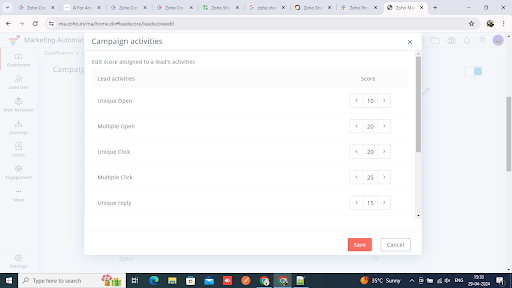
Configuring Lead Scoring
Configuring lead scoring in Zoho Marketing Automation is a straightforward process:
- Log into your Zoho Marketing Automation account.
- Navigate to the Qualification tab and select Lead Scoring.
- Follow the on-screen prompts to begin the setup process by clicking “Assign Scores Now.
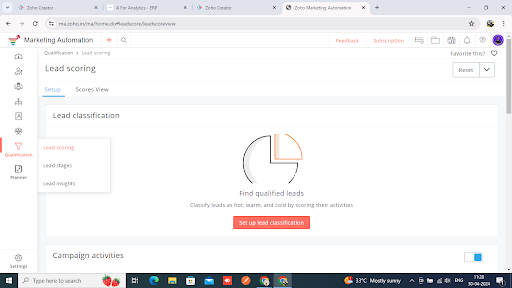
Field-Based Scoring Details
Field-based scoring enables businesses to assign scores based on criteria such as geographic area, business size, and industry. This tailored approach ensures that leads meeting predefined criteria receive appropriate scores, facilitating more targeted engagement.
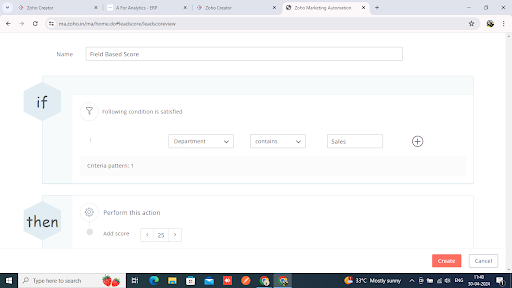
Web Assistant-Based Scoring
By leveraging web assistant-based scoring, businesses can convert website traffic into qualified leads. Scores are assigned based on factors like page views, actions taken, and predefined goals, allowing for precise lead evaluation.
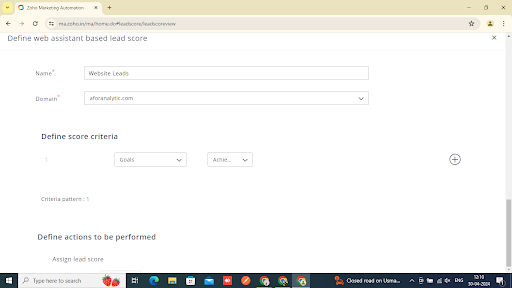
Best Practices and Practical Insights
- Define Clear Objectives: Before implementing lead scoring, businesses should clearly define their objectives and establish measurable goals. Whether the focus is on increasing conversion rates, improving lead quality, or maximizing sales efficiency, having clear objectives will help guide the lead scoring process and ensure alignment with broader business goals.
- Identify Relevant Lead Criteria: When developing lead scoring criteria, businesses should consider both demographic/firmographic data and behavioral indicators. By incorporating a mix of quantitative and qualitative factors, businesses can create a more comprehensive scoring model that accurately reflects the potential value of each lead.
- Continuously Monitor and Refine: Lead scoring is not a one-time exercise but rather an ongoing process that requires constant monitoring and refinement. By regularly analyzing the effectiveness of lead scoring criteria and making adjustments as needed, businesses can ensure that their scoring model remains relevant and effective over time.
- Integrate with Sales Processes: To maximize the impact of lead scoring, businesses should integrate it seamlessly with their existing sales processes. This may involve aligning lead scoring criteria with sales qualification criteria, establishing clear handoff procedures between marketing and sales teams, and providing sales reps with access to lead scoring data within their CRM system.
- Leverage Automation Features: Zoho Marketing Automation offers a range of automation features that can streamline the lead scoring process and improve overall efficiency. By automating tasks such as lead scoring calculations, lead assignment, and follow-up notifications, businesses can free up valuable time and resources to focus on other strategic initiatives.
- Measure and Analyze Results: Finally, businesses should regularly measure and analyze the results of their lead scoring efforts to identify areas for improvement and optimization. By tracking key metrics such as lead conversion rates, lead quality scores, and sales velocity, businesses can gain valuable insights into the effectiveness of their lead scoring strategy and make data-driven decisions to drive continuous improvement.
Conclusion: Streamlining Sales Efforts
By implementing automated lead scoring through A for Analytics and Zoho Marketing Automation, businesses can streamline their marketing efforts, attract high-quality leads, and drive increased revenue. This strategic approach optimizes resource allocation, minimizes wastage, and enhances overall organizational success.

